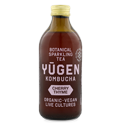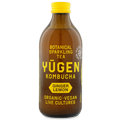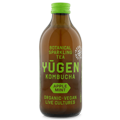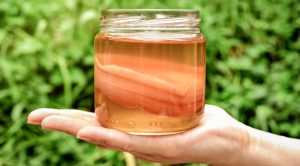
Kombucha is a natural tea drink, fermented with the help of billions of living beneficial microorganisms. Over thousands of years, microbes and mankind have evolved together into a beautiful symbiotic relationship. Let's peak into the miniature world of these tiny creatures and learn what they have to offer us. Welcome to the universe of fermented foods!

What is fermentation?
''Fermentation is the transformation of food by various bacteria, fungi and the enzymes they produce. People harness this transformative power in order to produce alcohol, to preserve food, and to make it more digestible, less toxic, and/or more delicious.'' - Sander Katz in ''The Art of Fermentation''
Fermentation is as old as mankind itself. Across the globe there are fascinating stories of ancient civilizations fermenting all sorts of delicious foods and drinks. One of the earliest recorded ferments ever was some sort of oatmeal based beer in Israël 13000 years ago.
Louis Pasteur, the French scientist also known as ''the father of microbiology'', was the first to prove that tiny organisms were responsible for the spoilage of food, and that it could be prevented by a controlled heat treatment, also known as pasteurization.

But as the decades have passed, health conscious customers have rediscovered the many benefits of living, fermented foods. Today, the global fermented foods and beverages market is forecasted to reach 1,08 billion by 2024, a 4,3% growth in just 5 years time.
But why are fermented foods such a big trend? Or why did our ancestors ever started fermenting in the first place?
Fermentation as preservation
In almost all historical cases, fermentation happened spontaneously. Cultures learned to generate more food and now had to develop strategies to preserve it. By trial and error they discovered that certain conditions preserve foods better than others. Fermentation allowed them to preserve fruits, vegetables, grains, dairy, and even meat, when refrigeration was not yet developed. The byproducts of fermentation such as, lactic acid, acetic acid, carbon dioxide, or alcohol prevent rapid spoilage, and thus enabled them to survive more difficult times. These days however, fermentation is mainly done for flavour and health benefits.
Fermented flavours
Walk by any gourmet food store and you will find a wide variety of fermented foods. Fermentation creates a bedazzling array of exquisite, yet sometimes challenging, flavours. Just think of the delicious tanginess of sauerkraut. Or the powerful sharp flavours of kimchi. And what would the culinary world be without all the varieties of delicious cheeses, and accompanying wines. Both can reach astonishing ages and develop rich deep flavours in the process. For example, the oldest edible cheese has cured for 18 years.

Health benefits of fermented foods
It's often stated that there are more bacteria than human cells in the body. It might be a stretch too far to say that we are more bacteria than human but it's undoubtedly true that our microbiome plays an important role in our overall health.
The live cultures in fermented foods can help restore the balance of friendly bacteria in your gut and may alleviate some digestive problems.
Fermentation can also aid in digestion by helping to break down nutrients in food. This makes them easier to digest than their unfermented counterparts.
Fermented foods can give your immune system a boost and reduce your risk of infections.
So while there is still much debate on how fermented foods actually support the body, most agree that consuming live fermented foods can positively influence our microbiome and overall health.

Fermented tea
Kombucha, or fermented tea, can be a great introduction to live fermented foods. It's tart flavour profile and refreshing nature make it a delicious & healthy alternative for regular soda. And just like that, you tap right into that rich culinary history of humankind. Everywhere on Earth, people are going back to the roots, experimenting with fermentation, sharing knowledge, stories, good health, and scobies along the way.
Learn more about kombucha and our brewing process in our related blogs and join our culinary revolution!
 I like Yugen Kombucha
I like Yugen Kombucha
 J'adore Yugen Kombucha
J'adore Yugen Kombucha






